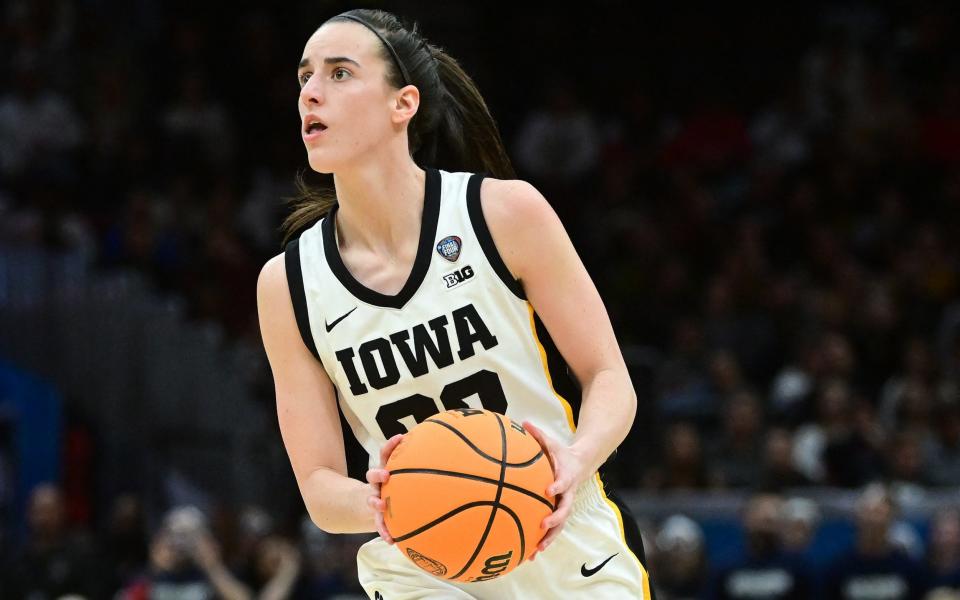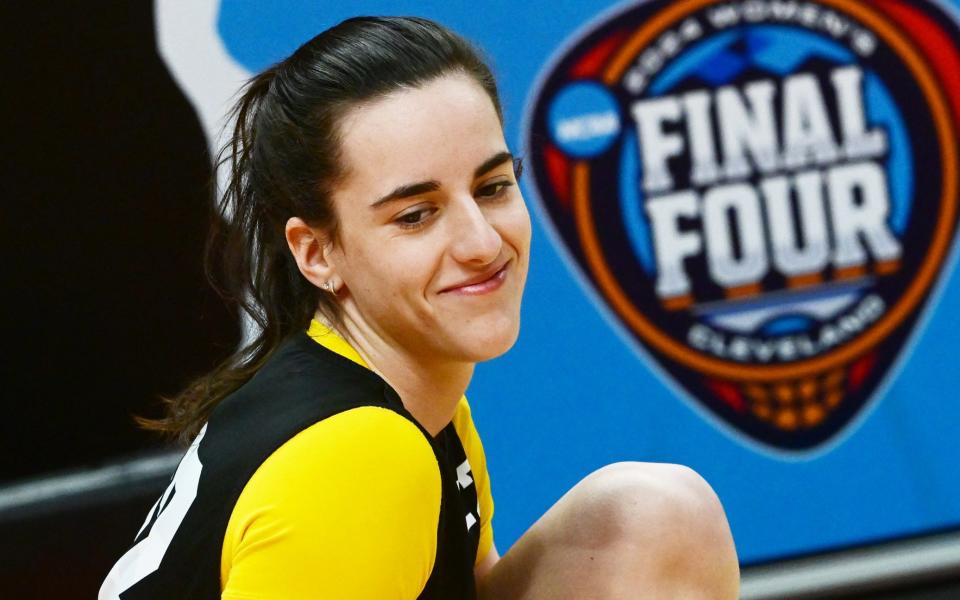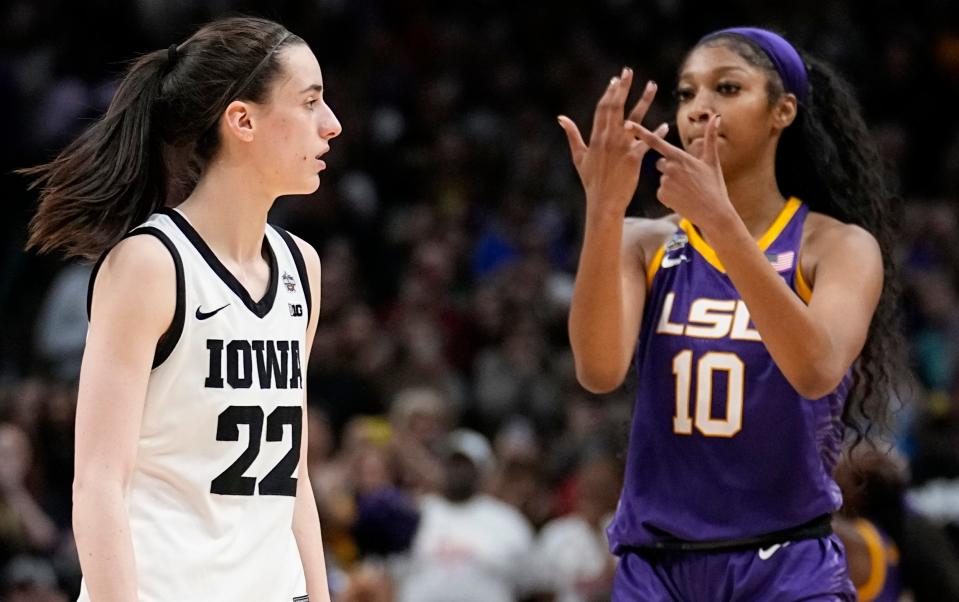The Caitlin Clark phenomenon: Basketball points records and ‘damn it’ hats

Last weekend’s Saturday Night Live opened with a parody of a sports broadcast. Kenan Thompson, playing the part of Charles Barkley, was asked what he thought of the previous evening’s men’s NCAA [National Collegiate Athletic Association] semi-final.
“Can I be real with you?” said Thompson. “I didn’t watch it.”
Pundit Kenny Smith (Devon Walker): “Me either. You know, it’s just hard to get excited when there’s better games on.”
Host Ernie Johnson (James Austin Johnson): “You mean the NBA?”
Smith: “No, the women’s tournament.”
Cue hollers and whooping from the studio audience.
SNL, like much of America, has generally taken potshots at the standard of women’s basketball, but such is its current upswing the men have become a punchline. Just as telling is the women’s college tournament being mainstream enough for a sketch to open an episode of a TV institution. Much of this is down to Caitlin Clark.

“My Uber driver, an old man, was talking about the women’s tournament final yesterday,” says women’s basketball expert Khristina Williams. “It’s happening, it’s leading news hours in sport shows. She attracts sports enthusiasts and casual fans as well.”
The noise around the 6ft point guard is becoming hard to ignore, but so are her numbers. She broke Pete Maravich’s 54-year-old college basketball all-time scoring record, long considered unreachable. She has scored the most three-pointers ever in a single season. When her Iowa Hawkeyes faced the South Carolina Gamecocks in the NCAA March Madness final on Sunday it attracted a record-breaking 18.7 million TV viewers, more than any individual night of last year’s NBA finals or baseball World Series.
"These awards never get old."
Caitlin Clark showed gratitude after winning the Wooden Award in back-to-back seasons 🏆 pic.twitter.com/wjAqQm6iMc— SportsCenter (@SportsCenter) April 9, 2024
Commercial deals have followed: insurers State Farm, Gatorade, Buick and an Iowan supermarket chain which partnered with her to launch Caitlin’s Crunch Time, a limited-edition breakfast cereal. Yet there was no fairytale ending to her college career, with Iowa losing to the undefeated Gamecocks in her final game before the WNBA draft next week.
This will not dim the enthusiasm for Clark. She will be taken with the first pick by the Indiana Fever, where ticket sales for the season have already spiked in anticipation of her arrival. Mostly people want to see her shooting, or rather the distance she shoots from. “Oh my,” said ESPN commentator Ryan Ruocco during Sunday’s final. “From the future!”
Like Steph Curry, who revolutionised the men’s game and forced the sport as a whole to prioritise three-pointers, Clark’s accuracy from deep has expanded what is possible. The “logo three” – a shot from close to the emblems which decorate the centre circle – has become a trademark.
“The logo threes are something that are so built for our media infrastructure,” says women’s basketball journalist Jackie Powell. “It’s perfect for TikToks and Instagram Reels. She also throws these zinger-type passes, these rockets, and that’s very appealing for people as well.”
CAITLIN CLARK HAS HER FIRST THREE OF THE NIGHT! #MarchMadness #WBB pic.twitter.com/hNkXaeR1ns
— TSN (@TSN_Sports) April 6, 2024
Williams adds: “It’s how she plays the game, the pace she plays at and how she’s able to move the Iowa offence. You really don’t see a lot of WNBA offences move in the way she is able to dictate with her playmaking skills. Overall it is her competitiveness and her work ethic which sets her apart.”
But working hard and shooting well is not enough to capture the imagination to the extent Clark has. She is also reframing expectations for female athletes. She was penalised for saying “damn it” to herself after missing a shot in January 2023, when male players frequently use far saltier language without punishment. Enterprising designers quickly launched T-shirts, baseball caps and pillow cases with the phrase, in Iowa colours.
There was further controversy in last year’s NCAA Championship when opponent Angel Reese taunted Clark with the same “you can’t see me” hand gesture, popularised by wrestler John Cena, that Clark had used herself two games previously. Reese, who is black, was condemned to the extent that “classless” was trending on the social network formerly known as Twitter.

Clark stuck up for Reese: “I don’t think Angel should be criticised at all. Men have always had trash talk, you should be able to play with that emotion. That’s how every girl should continue to play.”
She is undoubtedly important to her sport, although she is not alone. Reese is of sufficient profile that she declared for the draft in Vogue magazine last week while Sabrina Ionescu ran Curry close in a three-point contest at February’s All-Star Weekend.
Exclusive: Angel Reese (@Reese10Angel) is taking her talents to the WNBA! "I've done everything I wanted to in college," Reese said when sharing her plans to enter the WNBA draft with Vogue. See all of the details on the basketball star's next move here: https://t.co/oZWqwNsdeS pic.twitter.com/tEqyj77z8j
— Vogue Magazine (@voguemagazine) April 3, 2024
So other stars are emerging, but the expectation is for Clark to transform the WNBA. The most optimistic hope she will have a boosting effect on her sport comparable to Michael Jordan, but the league may have to wait for her to dominate in the way she has at college level. “Her game will translate very well; it might just look a little different at first,” says Powell. “It might take her a few years to be putting up college-like numbers.”
Adjusting to tighter defending will be a particular challenge. “She’s going to have a lot less space and a lot less time to pull back and step back [to shoot]. She will hit some of those shots, but there won’t be as many because she’s going to have bigger and faster players switching on to guard her.”
Pundits expect her to have a long and successful professional career, but the expectation she will put the entire league on her shoulders may prove unhelpful. “If we, as people who cover this sport, continue to view her as a monolith in the league it’s going to perpetuate some of the same things that were brought upon previous WNBA players,” says Powell.
“If you look at the WNBA, it is around 80 per cent women of colour and black women. So it’s a dangerous thing to say there is this one individual white player coming in to save the league.”

